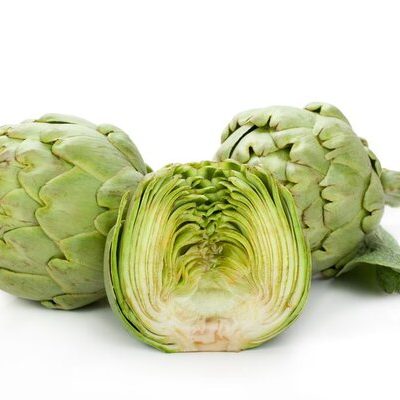
Artichoke
also known as Globe artichoke, French artichoke
What is an Artichoke?
The artichoke (Cynara cardunculus var. scolymus) is often considered a vegetable, although it is a type of thistle. It is a perennial plant that comes from the aster (Asteraceae) family. This plant resembles a flower with thick bracts and a softer interior known as the heart.
- Artichokes originate from the Mediterranean region and are considered one of the oldest foods known to humans.
- While it shares its name with the Jerusalem artichoke, these two plants are not genetically related.
The top 10 most common varieties include:
- Baby Anzio
- Big Heart
- Castel
- Chianti
- Fiesole
- Green Globe
- Imperial Star
- Lyon
- Sangria
- Omaha
Origin of artichokes
This vegetable can be traced back to ancient Greece when Theophrastus (371-287 BC) wrote that they were growing in Italy and Sicily. It is believed that this plant was first developed into an edible vegetable in the Mediterranean region. Wealthy Romans were known to preserve this food in honey and vinegar, so that they could enjoy it all year long. After Rome fell, the Arabs took artichokes with them to Spain where there is evidence of them in the 8th century. It was later in the 16th century that Catherine de Medici was credited with bringing this vegetable to France. Historians suggest that French immigrants brought artichokes with them to the United States, where they would flourish.
Function
The most common ways to eat this vegetable are steamed or boiled and served with a sauce. However, it’s also possible to grill, bake, bread, and fry them. Artichokes make an excellent addition to rice or pasta dishes. At the supermarket, you’ll find them canned and marinated, which makes them ideal for creating soups and salads. This vegetable is even a tasty ingredient for pizzas or savory pies.
Nutrition
Artichokes are an extremely nutritious food. A 128g serving of this contains:

This vegetable is low in fat while also providing fiber, healthy carbohydrates, and antioxidants. Some health benefits associated with this food include increasing “good” HDL cholesterol, regulating blood pressure, improving liver health, boosting digestive health, lowering blood pressure, and helping prevent cancer. Nonetheless, some individuals may be allergic to artichokes and should, therefore, proceed with caution. Additionally, women who are pregnant or nursing are advised to avoid consuming artichoke extract due to the lack of current studies on its effects. Furthermore, anyone who suffers from gallstones or bile duct obstruction should avoid artichokes as they promote bile movement.
Commercial Production
The commercial production of this vegetable requires cool temperatures that range from 75°F (24°C) in the day and 55°F (13°C) at night. Growing this vegetable begins with first planting seeds in a greenhouse, then transplanting seedlings in a field. It can take seedlings 4-6 months to mature after being transplanted. As a perennial plant, artichokes are harvested year-round and are generally hand-harvested. Once harvested, they are inspected for pests or damage, then packed on the fields before being transported to the market for sale.
Artichoke recipes
This veggie makes a great addition to any savory dish. Here are some popular recipes:
- Roasted Artichokes
- Spinach and Artichoke Dip
- Artichoke Soup
- Italian Stuffed Artichokes
- Baked Artichoke Hearts
FDA Regulation
The Food & Drug Administration classifies artichokes as a rarely consumed raw agricultural product. The organization regulated the growing, harvesting, and packing of this vegetable. The FDA also stipulates which parts of this vegetable can be used in canned artichoke products. Furthermore, the FDA regulates the use of artichoke leaves (Cynara scolymus L) as a food additive, most commonly in alcoholic beverages.
References
“Artichoke.” Encyclopædia Britannica, Encyclopædia Britannica, Inc., 19 Nov. 2020, www.britannica.com/plant/artichoke.
Stradley, Linda. “Artichokes History.” What’s Cooking America, What’s Cooking America, 12 Aug. 2016, whatscookingamerica.net/History/ArtichokeHistory.htm.
Rupp, Rebecca. “The History of Artichokes.” National Geographic, National Geographic, 3 May 2018, www.nationalgeographic.com/culture/food/the-plate/2014/11/12/artichokes/.
Brown, Mary Jane. “Top 8 Health Benefits of Artichokes and Artichoke Extract.” Healthline, Healthline, 16 Jan. 2019, www.healthline.com/nutrition/artichoke-benefits.
